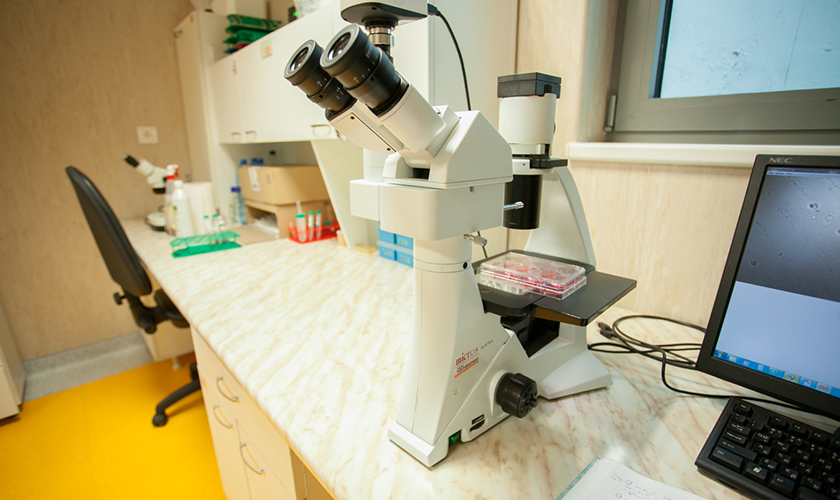
Cervical smear (PAP test) - accents
The examination is conducted once a year for all women between 21 and 65 years of age
The procedure is relatively simple and painless and takes no more than a few minutes.
The results of the cytological study (the degree of changes in the nucleus and cytoplasm of the cell) are classified into five groups with Papanicolaou Stain Method.
If the result of the cytoplasm test shows a group of PAP III, IV, V, additional tests are specified to refine the diagnosis and the treatment.
Cervical smear (PAP test)
What is PAP test (cytoplasm)?
The PAP test is a microscopic examination of cells from the cervix for early detection and diagnosis of cervical cancer. The test was developed in 1928 by George Papanicolaou and is therefore also known as the PAP test.
When is the PAP test (cytoplasm) recommended and how often?
It is recommended that the test is conducted once a year for all women aged 21 to 65 years, as well as for girls under 21 years of age who have sex. In women at increased risk, the test is recommended once every six months or as recommended by the physician. After the age of 65-70 and discontinuation of active sex, most women may not do the test, if their previous three tests in the last ten years showed three negative results.
How to prepare for the PAP test (cytoplasm)?
It is desirable for at least 24 hours before the smear not to use vaginal swabs, to have vaginal rinses or to have sexual contacts. Do not use vaginal globules or creams. You also need to have no menstrual bleeding - the optimal days for PAP test are 10 - 14 days of the menstrual cycle.
How is the PAP test performed?
The procedure is relatively simple and painless and takes no more than a few minutes. It is done in a gynecological office, the woman sits in the gynecological chair, and the gynecologist puts a speculum in her vagina for better visibility of the portio vaginalis colli uteri (PVCU) and the cervical canal (canalis cervicalis - CC). Using a brush, cells are taken from the lining of the uterine cervix and the cervical canal. The cells taken are placed in a container with a preservative solution. Subsequently, the cells are easily detached from the liquid, and practically none of them is lost. The sample is sent to a specialized laboratory called cytology, where an apparatus handles the sample taken. Then the material is stained, fixed, and examined under a microscope by a physician - a cytopathologist.
What does the patient feel during PAP test?
Making the PAP test is not painful. However, it is possible for the woman to experience slight discomfort or slight bleeding after taking the probe.
What are the possible results of тхе PAP test?
The results of the PAP test are classified into five groups with Papanicolaou Stain Method:
РАР I – healthy cells. No treatment is needed;
РАР II – cells showing the most common inflammatory disease. Anti-inflammatory treatment is often required;
РАР III – a dubious result;
РАР IV – the presence of single cancer cells;
РАР V – the presence of multiple cancer cells.
If the result of the PAP test shows a group of PAP III, IV, V, additional tests are specified to refine the diagnosis and treatment. These tests can be a new PAP test, HPV test, colposcopy (with or without biopsy), cervical canal ablation. If the results of additional studies indicate precancerous changes, the doctor will direct the woman for follow-up treatment.
PAP test - contact us
Check your gynecological health, book an appointment for a consultation with our highly qualified specialists. Call at 02 920 09 01.
If you have chosen our prophylactic packages, you need to specify which of the packages you want to use. See the Comparative Table of our Special Prevention Packages HERE.
Video: Gynecological and mammographic prophylactic at Dr. Shterev Hospital
Prevention saves lives! This is the credo of the Preventive Medicine Sector at Dr. Shterev Hospital. To underline the importance of medical prevention for women’s health, we created an exclusive video in which we present essential aspects of gynecological and mammalogical prophylactic care. Watch the video to learn about the latest trends in female prophylaxis, and remember that your health is in your hands.

PAP test - resume
Dr. Hospital offers highly specialized gynecological examinations, consultations, diagnostics, and treatment of various gynecological complaints and illnesses. If you have difficulties in selecting a specialist to find a solution for your health problem, you can contact our Patient Care Coordinators at "Information Desk" or call our Contact Center. Below you can read the explanation of most of the specialized terms used in the section "Gynecological Prophylactic".
 Медицински комплекс „Д-р Щерев”
Медицински комплекс „Д-р Щерев”